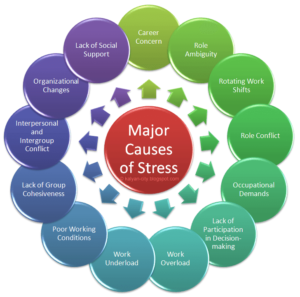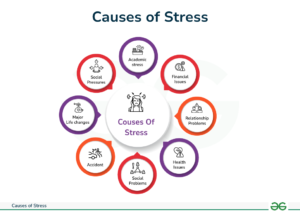Top 10 Causes Of Stress In Every Day Life:
Introduction:
We all experience moments when life feels very strong. From tight deadlines at work to unexpected life changes, the causes of stress can appear in different forms.
While a little stress can push us to perform better, too much can damage our health. Understanding the causes of stress helps us control it before it takes a toll on our mind and body.
- Financial Problems:
One of the most common and overwhelming causes of stress is financial problems. Money plays a major role in our daily lives, and when we do not have enough to meet our needs or manage unexpected expenses, it can lead to constant worry and anxiety.
Financial issues may arise from low income, high debts, job loss, poor budgeting, medical emergencies, or rising living costs.
When people experience financial instability, they often feel trapped in a cycle of bills, loans, and expenses that seem impossible to manage.
https://www.mind.org.uk/information-support/types-of-mental-health-problems/stress/causes-of-stress/
This can create mental pressure, sleepless nights, and even health problems. The burden of unpaid bills or overdue rent can make individuals feel hopeless and frustrated.
To reduce financial-related stress, it’s important to create a realistic budget, track spending, prioritize essential needs, and start building an emergency fund. Seeking financial advice from experts or using debt management plans can also help ease the pressure.
By taking small, consistent steps, we can slowly regain control over our finances and reduce the mental burden those money problems bring.
2. Work Pressure:
If we are taken work pressure is another major cause to stress in modern life. Many people face high expectations, tight deadlines, and heavy workloads that leave little room for rest. In competitive work environments, the constant need to perform at our best can lead to mental and emotional tiredness when the demands of a job cross the limit our capacity, we often feelburdened. Long working hours, unclear job roles, or lack of resources make it harder to complete tasks efficiently. This not only affects productivity but also creates a persistent sense of worry and tension.
Stress from work pressure can also spill over into personal life. Many employees find it difficult to balance professional and family responsibilities, leading to burnout. Physical symptoms like headaches, fatigue, and poor sleep are common signs of work-related stress.
When we are manage work pressure, it’s important to set boundaries, prioritize tasks, and communicate openly with supervisors about workload concerns.
By finding a healthier balance between work and life, we can prevent workplace stress from dominating our mental well-being and overall happiness.
https://fitsdaily.com/emergency-fund-f…how-to-build-one/
Health Issues:
Now a days health issues are a significant source of stress for many people. When we or our loved ones face illnesses, chronic conditions, or sudden medical emergencies, it not only affects physical well-being but also impacts mental and emotional stability.
The stress of dealing with symptoms, undergoing treatments, and worrying about recovery can be overwhelming.
In addition, medical costs can worsen financial problems, creating a cycle of tension. Long-term illnesses often lead to changes in daily routines, reduced work capacity, and isolation, which further contribute to stress.
Relationship Conflicts:
Relationship conflicts whether with a spouse, family member, friend, or colleague are another major cause of emotional stress.
Relationship conflicts mean fights, arguments, or misunderstandings between people who are close to us, like family, friends, or partners. These happen when we don’t agree on something or when feelings get hurt.
If two friends stop talking because one forgot the other’s birthday, that is a
Relationship conflict.:
. Fighting or arguing again and again without stopping. Example:
If two brothers argue almost every day about small things, that is constant conflict create emotional pressure that can spill over into other areas of life, affecting work performance, sleep quality, and even physical health..
Academic Pressure:
Academic pressure is especially common among students, but it can also affect adults pursuing higher education or professional courses. The need to maintain high grades, meet deadlines, pass exams, and compete with peers can cause significant mental strain. Parental expectations, fear of failure, and balancing studies with personal life further increase stress levels lasting for a long time academic pressure can lead to burnout, anxiety, and loss of interest in learning, which negatively impacts performance and overall well-being.
Social Media and Comparison:
While social media connects us to the world, it also fuels stress through constant comparison. Seeing others’ achievements, lifestyles, and appearances can create feelings of inadequacy or self-doubt.
Many people unconsciously compare their real lives to the highlight reels others post online, leading to low self-esteem and anxiety.
The pressure to present a perfect life on social platforms can also be mentally exhausting. Over time, excessive social media use can disrupt sleep patterns, reduce productivity, and harm mental health.
Lack of Work-Life Balance:
A lack of work-life balance happens when professional responsibilities consume most of our time and energy, leaving little room for personal life, rest, or hobbies. Constantly working long hours or taking work home can lead to fatigue, reduced social interaction, and poor mental health. Without time to relax and recharge, stress builds up and can cause burnout. Maintaining a healthy balance between career and personal life is essential to sustain productivity, relationships, and emotional well-being.
Major Life Changes:
Major life changes such as marriage, divorce; moving to a new city, switching jobs, or becoming a parent can trigger significant stress. Even positive changes require adaptation, and the uncertainty involved can make people anxious.
Adjusting to new routines, environments, or responsibilities often demands time and mental energy, which can leave individuals feeling overwhelmed. If these changes happen suddenly or unexpectedly, the stress can be even more intense.
Environmental Factors:
The environment we live and work in plays an important role in our stress levels. Crowded spaces, noise pollution, poor air quality, and unsafe neighborhoods can create constant tension. Similarly, working in an overly competitive or toxic workplace can contribute to ongoing anxiety. A cluttered or uncomfortable living space can also make it harder to relax and recover from daily pressures. Over time, these environmental stressors can negatively impact both physical and mental health.
Uncertainty about the Future:
Not knowing what the future holds can be deeply stressful. This uncertainty may come from job instability, financial insecurity, political unrest, or global events such as pandemics or economic crises. The fear of “what might happen” can lead to overthinking, anxiety, and difficulty making decisions. When people feel they lack control over their future, it often results in a constant state of worry, which can interfere with sleep, focus, and overall happiness
FAQ about the Top 10 Causes of Stress?
Q1: Can stress be completely avoided?
No, stress cannot be completely avoided, but understanding the causes of stress can help us manage it effectively.
Q2: What is the most common cause of stress worldwide?
Financial problems and work pressure are among the top causes of stress globally.
Q3: How does stress affect health?
Prolonged stress can lead to headaches, digestive issues, heart problems, and weakened immunity.
Q4: How can I reduce stress naturally?
Exercise, meditation, healthy eating, and setting boundaries can reduce the impact of the causes of stress.
Q5: Can small lifestyle changes make a difference?
Yes, small changes like better time management and digital detox can reduce daily causes of stress.
Conclusion
Stress is an unavoidable part of life, but identifying the causes of stress gives us the power to control it. Whether it’s financial trouble, work overload, or social comparison, awareness is the first step toward relief. By making small lifestyle changes and seeking support when needed, we can lead a healthier and happier life.
